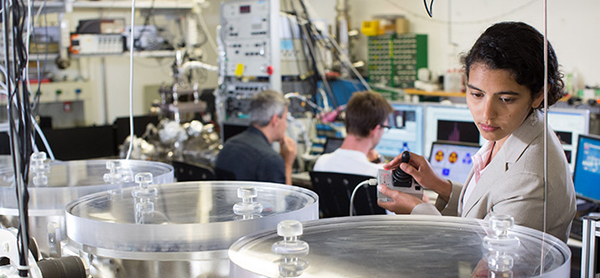SNSF planning envisages a strong Swiss research scene

A responsive mode of project funding based on competing proposals is and will continue to be the SNSF’s core business. However, science itself is changing at a breathtaking pace. In its multi-year programme for the 2017–2020 period, the SNSF responds to the challenges facing Swiss research and presents arguments in favour of prioritising the ERI sector.
The trend towards more datadriven research, internationalisation and the acceleration of research are challenges that the Swiss research community must tackle. In addition, it needs to meet the increasingly higher demand for transparency and dialogue within our society.
The SNSF has set itself four main goals
In its multi-year programme 2017–2020, the SNSF shows how it can contribute to the positive development of Swiss research in the coming years. It has set itself four main goals:
- To continue promoting excellence and internationality in research and evaluation by responding to new requirements, awarding grants based on a competitive process and incentivising collaboration, transparency and good scientific practice.
- Promote early independence for young researchers and show them academic career prospects that are clear and attainable, thereby enhancing the quality and social acceptance of Swiss research.
- Join in efforts to accelerate knowledge transfer throughout the economy and society at large by strengthening funding activities at the interfaces between research and innovation, particularly by collaborating on the “Bridge” programme with the CTI.
- Launch initiatives aimed at prioritising the development of new research fields and encourage the scientific community to form networks in strategically important areas.
The ERI sector must have financial priority
All in all, the SNSF will need approximately CHF 4.5 billion between 2017 and 2020 in order to be able to implement all the planned measures. If parliament decides to accept the stabilisation programme for the federal budget without any changes, the SNSF will receive CHF 465 million less. This would make it necessary for the SNSF to narrow down its priorities and shelve some of its plans. Work on a leaner multi-year programme has already started. Despite the financial pressures, there is one point that the policymakers should not lose sight of: investments in research, education and innovation are as essential as ever for the prosperity of Switzerland as a centre of learning and industry. This may be even more so in view of the lack of skilled workers, the strong Swiss franc and the threat of exclusion from Horizon 2020, the EU’s framework programme for research and innovation. For these reasons, investments in the ERI sector must remain a top priority of financial planning.